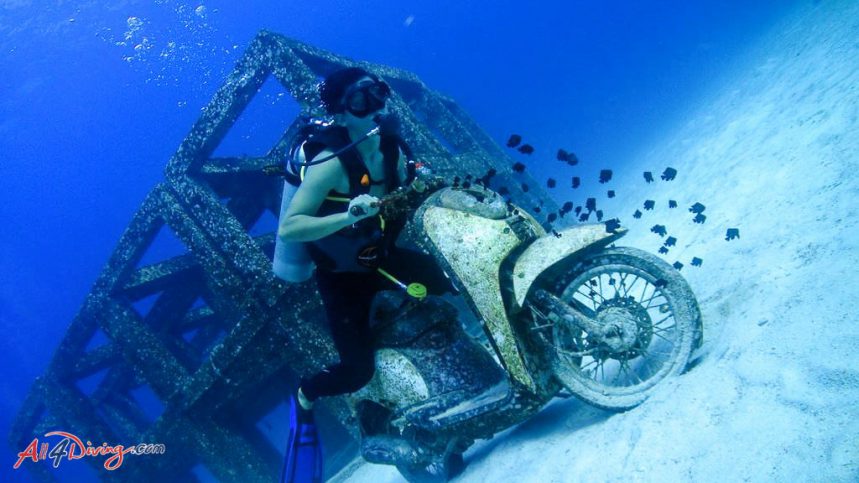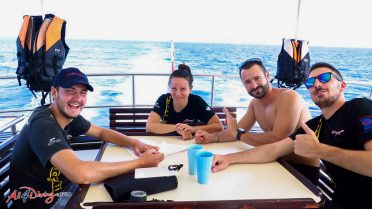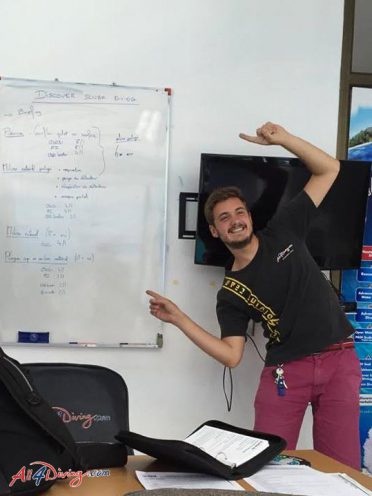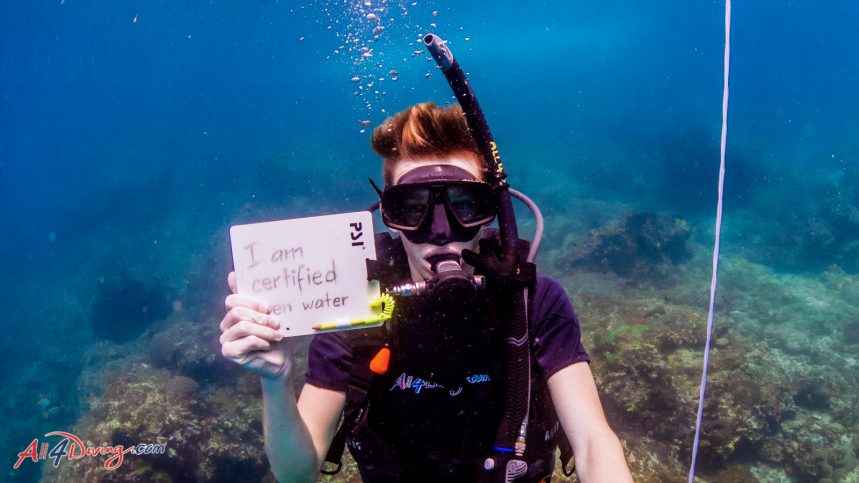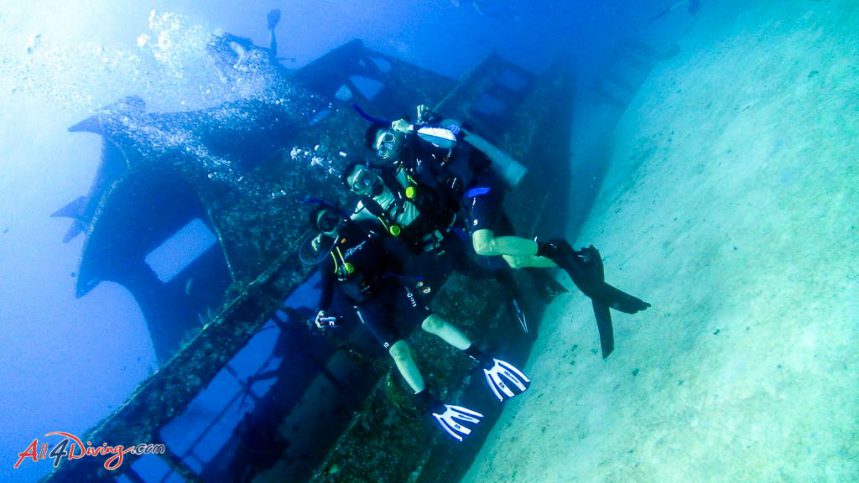Learn How to Dive
Scuba Diving Lessons for Beginners
How to dive? This is a question that many people who want to discover the underwater world are wondering.
Learning to SCUBA dive is an extraordinary adventure in itself. By learning how to dive, you will discover a magical world full of life and beauty that exists just beneath the surface of the water. There are many dive training centers offering scuba qualifications through basic diving lessons and underwater training, with branches in nearly all parts of the world. Though scuba dive tuition makes demands on both your body and mind, it is a very rewarding and fun experience.
Learn how to dive.
Recreational scuba diving is a safe underwater sport if you have undergone formal training before taking to the water. It would be extremely foolhardy to proceed on your own, as there is no substitute for a proven program of scuba instruction. Moreover, no dive center or charter boat will take you diving without recognized scuba diving qualifications. Considerations of safety apart, you will feel more confident, relaxed, and prepared for the underwater experience if you are fully trained. Basic Open Water training qualifies you to go diving without supervision. Learning how to dive is easy and most of the time very funny. It will not, however, teach you how to dive under ice, in a cave, or beyond recreational diving depth limits. For these diving activities, you need to meet further advanced scuba qualifications and gain more experience. Through this article, you will discover almost every aspect of a scuba training you will follow with a reputable organization such as PADI, SSI or other.
Who can learn to dive?
Practically anyone can learn to dive, but there are a few basic health requirements. After all, if recreational scuba diving is a great adventure, is also sporty. For instance, if you suffer from asthma, you will need to consult a doctor beforehand, although the condition need not be a barrier. Scuba diving is not a strenuous sport, but you may encounter situations that require you to be reasonably fit – lifting yourself out of the water onto a boat, for example. Scuba diving when pregnant is not advisable, but it is possible to pick up the dive theory and basic snorkeling skills during pregnancy, and continue with the full dive training after your child is born. There are special junior diving courses for those under 15 years old who wish to learn to dive, and advancing years are not necessarily a barrier to learning either, given a fair level of fitness and approval from a doctor. Many disabled people also enjoy the sport of scuba diving, and dive training programs have been adapted to embrace a range of disabilities.
Where to learn to dive?
You can learn how to dive everywhere around the world. However, there is always more comfortable and fun to take lessons in scuba diving while on holiday in tropical destinations where the water is warmer with a rich marine life. There are a different diving organizations with whom you can learn to dive. Other divers may recommend the one they learned with – which is not a bad start – but investigate all the dive training agencies, since each offers a different approach to tuition.
The world’s largest scuba dive training organization is PADI (Professional Association of Diving Instructors). They operate all over the world, and most dive sites you visit around the world are affiliated to PADI. As a worldwide organization established for a long time, with training methods that have been proven, choosing PADI for your diving lessons would be more than judicious. Our advice is to choose a reputable PADI scuba diving center such as PADI Career Development Center (CDC). Choosing CDC’s is the best guarantee you may have regarding your dive education – they are simply the highest in PADI’s ranking.
Several other training organizations are prominent in the US, including NAUI (National Association of Underwater Instructors) and SSI (Scuba Schools International). In the UK, most diving clubs are affiliated to BSAC (British Sub-Aqua Club), and their training is tailored to the waters around the UK. You may also come across the SAA (Sub-Aqua Association) and the SSAC (Scottish Sub-Aqua Club); the CFT/IUC (Irish Underwater Council) in Ireland; and CMAS (Confédération Mondiale des Activités Subaquatiques) in France.
Learn how to dive & where – the choice is yours.
For the beginners, the various training organizations offer broadly similar diving lessons in terms of content and safety standards but teaching methods maybe different. The best course of action is to take advice from experienced divers and do what suits you. Don’t hesitate to ask your trainer’s qualifications and the dive center’s qualification before starting a course.
Diving lessons and underwater dive training for beginners.
For beginners, learning how to dive involves gaining some knowledge of essential theory as well as training in practical skills. Most of the time these skills are practiced in a pool before getting into open water but, depending on where you learn, they can be taught in a lagoon or in the shallows.
Mastering the dive theory.
Before you learn how to dive in the sea or a lake, your dive training will always start with theory. The theory takes usually half day. You will be taught about basic diving equipment, the principles involved in breathing gas at depth and under pressure, safety skills, communication, navigation, and much more. You will learn to carry out simple calculations relating to the physics of diving. Don’t worry none of the theory is difficult, but it does demand a few hours of study. Dive centers run this part of the training in different ways – some rely on traditional classroom teaching, others present materials on DVD or online – so choose the way that suits you best. In all cases, you will be provided with a reference manual containing all the material you need to know.
The theoretical part sets the basis and principles of general diving procedures beginner divers need. Overall, there are several sections you’ll study of independent way, but in reputable dive centers you will also be accompanied by an instructor. You will answer exercise questions within the reading, and complete a knowledge review for each section. At the end, you will show your understandings of the theory by completing a comprehensive final exam. With the advent of internet, modern dive centers, also offers theoretical learning methods online. This way you can study the theory at your own rhythm from home or office. Mainly, the sections cover:
- Buoyancy control. What is the buoyancy? How and why controlling your buoyancy is one of the most important skills of scuba diving? Buoyancy control lets you control the dive – you can feel weightless, or float effortlessly on the surface. By learning buoyancy control, you’ll be able to relax and avoid accidentally harming the underwater world.
- Comfortable descents. At one time or another’ you’ve probably dived to a pool bottom and felt discomfort in your ears. You’ll learn how to avoid discomfort, what to do if you feel discomfort, and some of the things that can make equalizing difficult.
- Comfortable ascents. What should you do if you feel discomfort in your ears and sinuses during ascent? Although it’s rare, if you have ear or sinus equalization problems when you ascend, you’ll want to know what to do about it.
- Breathing Underwater. What’s the relationship between depth and air supply? What is the most efficient way to breathe underwater? Breathing underwater differs in a couple respects from breathing at the surface. You’ll learn how you breathe as a diver so that you don’t waste air, and so you stay relaxed.
- Staying warm while diving. How can you stay warm underwater? What should you do if you begin shivering? Your instructor will present you different dive suits and explain you how to use the. You’ll also learn how to react if you feel cold underwater or you start shivering.
- Be streamlined when you dive. How should you move underwater? You’ll learn how to move slowly and steadily to avoid overexertion and getting out of breath. You’ll get an overview of how to streamline yourself to reduce drag; it slows you down, wastes energy and can damage the environment.
- Care for yourself. How to prevent or control most diving problems that occur at the surface? How can you help yourself in the unlikely event a problem does occur at the surface? You’ll find that if you and your buddy dive within your limits, plan your dives and follow safe diving guidelines, you’ll usually avoid problems. However, diving problems can occur, so you need to know the basics for handling them.
- Solution thinking underwater. How can you prevent or control most problems that may occur underwater? Given a certain out of air situation, what emergency procedure would you use to get to the surface? Knowing the basics for solving underwater problems prepares you to handle problems if they occur.
- Care for others divers. What are the basic steps to assisting another diver? Since you care about your diving buddy, you also need to know how to assist your buddy if necessary.
- Gas narcosis. How should you react if gas narcosis becomes a problem? Gas narcosis can create a hazard, so you’ll want to know how to deal with it.
- Decompression Sickness. How do you avoid decompression sickness? What should you do if you suspect you might have decompression sickness symptoms? It’s easy to minimize the risk of decompression sickness by staying within established limits and following guidelines. If you fail to do this, decompression sickness is potentially life threatening and you should know how to if occur.
- Dive tables and dive computers. What do these terms mean: dive profile, no decompression limit, bottom time, repetitive dive, surface interval, and pressure group? You’ll discover that dive tables and computers help you determine the maximum time and depth limits for avoiding decompression sickness. To use tables and computers, you have to understand the terminology, recommendations and guidelines that apply to them.
Let’s go scuba diving – learn how to dive in open water.
Swimming pool dive sessions.
Basic practical skills are taught in confined water – usually a swimming pool or shallow water just off a beach. You will be expected to pass a simple swimming test to show your instructor that you are safe and comfortable in the water before they begin to teach the fundamental underwater skills. After this initial stage, you will progress into open water, where you will undertake a few introductory dives in order to get used to diving in deeper water and build your confidence to dive in the open sea.
The goal of the pool training dive sessions is to provide the skills base for making the transition to Open Water dives. During the confined water session you will start by learning very simple skills and progressively combine them in more complex ones. During the pool session, your instructor will teach you by demonstrating first the skill you need to perform as well using different techniques of demonstration if necessary. At the end of your confined water session, you will be able to demonstrate the same skills that you will do in Open Water dives.
Open Water dives training
After one or two days of theory lessons and swimming pool dive training, It’s time to go diving for real! For your open water dives, dive centers will bring you to different diving spots where you will perform 4 – 5 training dives. Before each dive, your instructor will give you full briefing of dive skills you should demonstrate, safety rules and the plan of the dive. At the beginning of each dive, you have to show few skills you’ve learned in pool and then, your instructor will lead you for a fun dive. This is the best part of your diving course.
Once you have learned how to dive, stay safe while diving.
Recreational diving is an extremely safe activity as long as you receive the correct dive training and keep your skills up to date. Choosing the right training agency, course, and instructor is therefore vital. Most instructors are highly trained and dedicated to their job, but there will always be a few “bad apples” in any profession, so take advice from friends, diving clubs, and websites before you enroll. Do not be afraid to ask questions during your training, simple as they may seem; you can even request a different instructor if you do not feel comfortable. Many people take up diving as a vacation activity and only get a chance to practice once or twice a year. If you have not dived for a while, it is a good idea to take a refresher course, and carry out a trial dive to check all your gear and your skills before venturing into deeper water. Now that you learn how to dive, don’t forget the golden rules of scuba diving:
- Never hold your breath underwater – breath slowly and deeply
- Check often your air gage
- Always ascend slowly
- Establish positive buoyancy at the surface
- Never go beyond the limits for which you ware trained.
Learn how to dive for kids and the disabled. Specialized dive training.
Diving is an inclusive, accessible sport, and there are many training options for children and the disabled. If you are already qualified but wish to undertake further training, there are numerous courses of advanced tuition to make you a better and more confident diver.
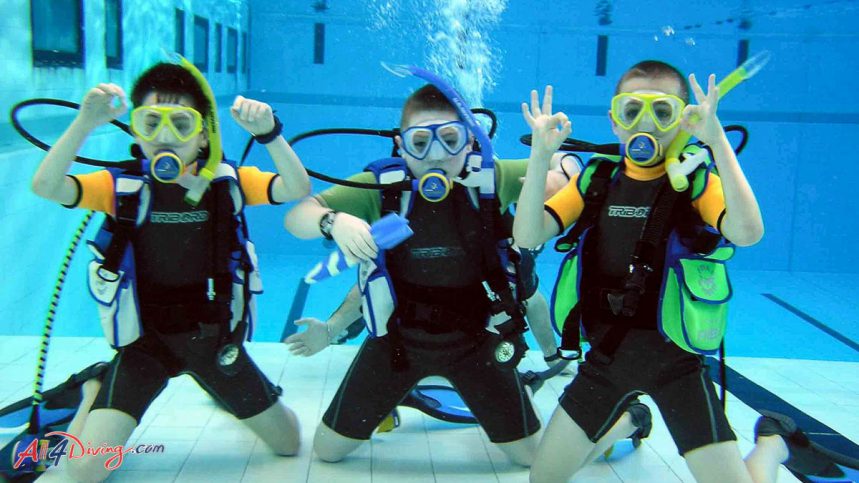
Tailored diving lessons
Though standard Open Water diving qualifications have a minimum age requirement, usually 10, children are now well catered to in diving. This means it can be a family sport – not one that is just for adults. For younger children, introductory courses are available, such as PADI’s Bubble-Maker course, or diving clubs for children. These programs are designed to teach basic skills that lead to full Open Water diving qualifications. Junior diving permits, available for children between 10 and 14 years old, are similar to basic Open Water qualifications, but place special safety restrictions on the maximum depth to which the holder can dive. Advances in training techniques mean that more disabled people are able to take up diving than ever before.
Diving makes you effectively weightless, and the freedom of movement this offers makes the sport especially beneficial for those with limited mobility. The only condition that is an automatic bar to becoming a diver is epilepsy, due to the risk of seizures while submerged. However, blindness, paraplegia, and many other conditions have all been accommodated by adaptive training programs. The general rule is that if you have been cleared to dive by a doctor specializing in dive medicine, then training can begin.
Learn how to dive beyond the basic limits.
All the major training organizations offer courses that aim to take you a step onward from the basic Open Water qualification. Such courses serve to refine your basic skills and introduce you to new challenges, such as deep diving, or diving in conditions of low visibility.
They will also cover rescue and survival skills, and can be the first step on the path toward becoming a diving instructor. In addition to these skills development courses, there are also many specialty courses, which teach the technique and theory of activities such as deep diving, wreck diving, and mixed-gas diving. Such courses include dives to put new skills into practice, and help to improve your general diving experience.


